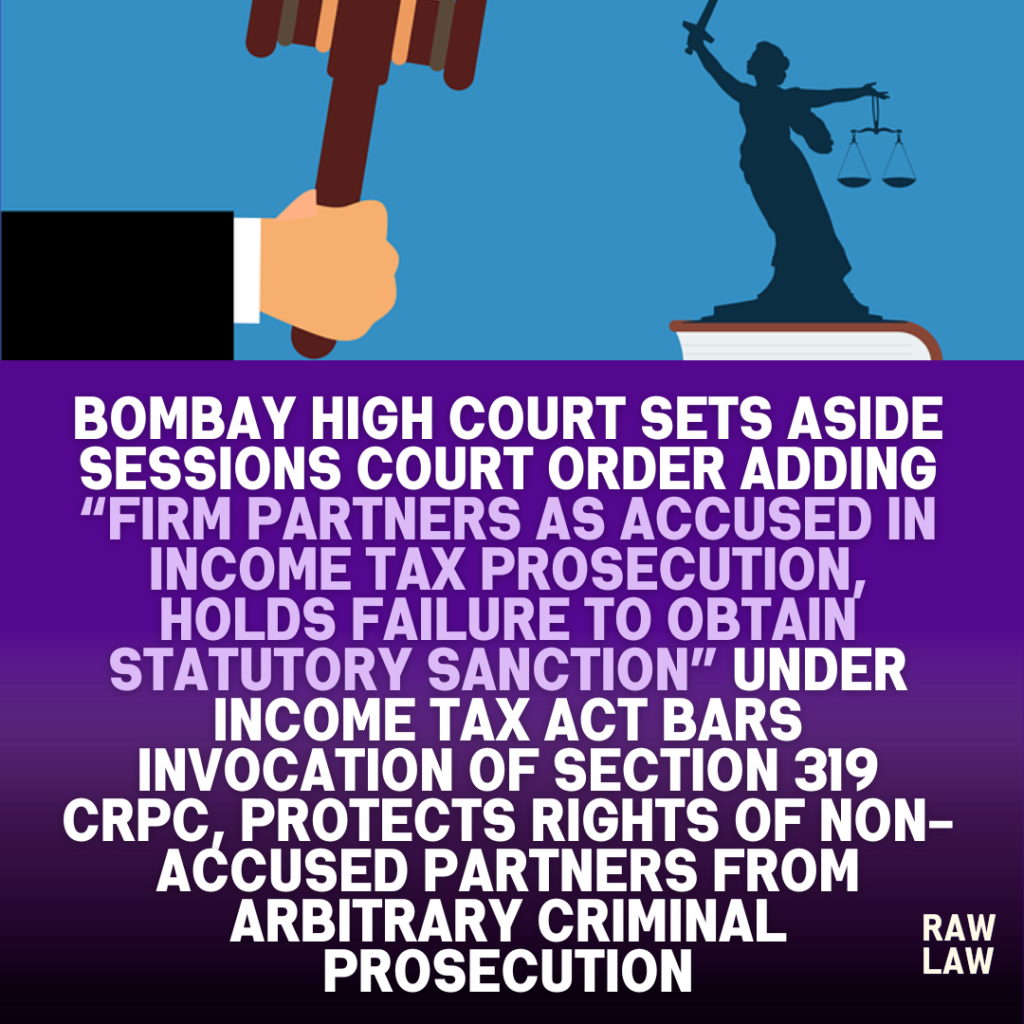Court’s Decision
The Bombay High Court allowed the revision applications and set aside the Sessions Court order that had directed impleading of three partners of a firm as accused under Section 319 of the Code of Criminal Procedure in pending prosecution under Sections 276C and 277 of the Income Tax Act. The High Court held that absence of sanction under Section 279 of the Income Tax Act coupled with lack of prima facie evidence regarding personal involvement of the partners disentitled the Income Tax Department from prosecuting the partners as accused. The High Court restored the Magistrate’s order declining the Section 319 application.
Facts
The applicants comprised a partnership firm and its partners. The Income Tax Department initiated criminal proceedings against the firm and one partner (since deceased) for alleged willful tax evasion during assessment years 1981-1984. After the death of the original partner accused, the Department sought to implead other partners as accused. The Magistrate rejected the application under Section 319 CrPC citing lack of sanction. However, the Sessions Court reversed this, allowing the addition of partners as accused, leading to the present revision applications before the High Court.
Issues
- Whether the Income Tax Department could add new accused under Section 319 CrPC without obtaining prior sanction under Section 279 of the Income Tax Act.
- Whether evidence on record met the threshold for invoking Section 319 CrPC.
- Whether the Sessions Court erred in reversing the Magistrate’s rejection of the application under Section 319 CrPC.
Petitioner’s Arguments
The applicants argued that the order adding them as accused was unsustainable because no statutory sanction was obtained under Section 279 of the Income Tax Act, which is mandatory for prosecution. They further contended that the Income Tax Department was aware of the partnership structure since inception and had chosen not to prosecute the applicants initially. They also argued that no new incriminating material had surfaced during trial to justify invoking Section 319 CrPC against them.
Respondent’s Arguments
The State contended that evidence during trial disclosed that the applicants were partners of the firm during the relevant period, making them liable under Sections 276C and 277 of the Income Tax Act. It was argued that Section 278B of the Act made all partners liable for offences committed by the firm, and thus, addition of the applicants as accused was valid under Section 319 CrPC.
Analysis of the Law
The Court analysed Section 279 of the Income Tax Act, which mandates prior sanction for prosecution, and Section 319 CrPC, which empowers courts to proceed against persons appearing to be guilty during trial. It held that statutory sanction is a jurisdictional requirement and failure to comply vitiates proceedings. The Court emphasized that Section 319 CrPC must be exercised sparingly, requiring cogent evidence indicating direct involvement of the individuals sought to be added.
Precedent Analysis
The Court relied upon the Supreme Court judgments in Surinderjit Singh Mand (2016), Shankar (2024), and State of Karnataka v. Pratap Chand (1981), which stressed the necessity of sanction and strong prima facie evidence before invoking Section 319 CrPC. It also relied on Bharat Raj Meena (2024) to reinforce the threshold required for invoking Section 319.
Court’s Reasoning
The Court noted that the Department had earlier admitted the applicants were not accused but merely representatives of the firm. There was no subsequent sanction obtained under Section 279, and the evidence during trial did not establish their direct involvement or responsibility in the alleged offences. The Court held that continuation of proceedings against them would amount to abuse of process.
Conclusion
The Bombay High Court quashed the Sessions Court order and restored the Metropolitan Magistrate’s decision rejecting the application under Section 319 CrPC. It held that without sanction and requisite prima facie evidence, partners cannot be added as accused mid-trial.
Implications
The judgment reinforces protection against arbitrary prosecution of partners in corporate offences without satisfying statutory prerequisites. It strengthens the procedural safeguards requiring sanction and sufficient evidence before expanding the circle of accused in ongoing prosecutions.
Referred Judgments Summary
- Surinderjit Singh Mand (2016): Sanction under special laws necessary for invoking Section 319 CrPC.
- Shankar (2024): High threshold of satisfaction required for invoking Section 319 CrPC.
- Pratap Chand (1981): Liability of partners limited to those in charge of day-to-day affairs.
- Bharat Raj Meena (2024): Affirmed rigorous evidentiary standards under Section 319 CrPC.
FAQs
1. Can new partners be added as accused in Income Tax prosecutions without sanction?
No, sanction under Section 279 of the Income Tax Act is mandatory before proceeding against new accused partners.
2. What is the evidentiary standard for invoking Section 319 CrPC?
Courts must be satisfied by strong prima facie evidence indicating personal involvement in the offence before exercising Section 319 CrPC powers.
3. Can failure to obtain sanction invalidate criminal proceedings?
Yes, absence of statutory sanction renders the proceedings without jurisdiction and liable to be quashed.



